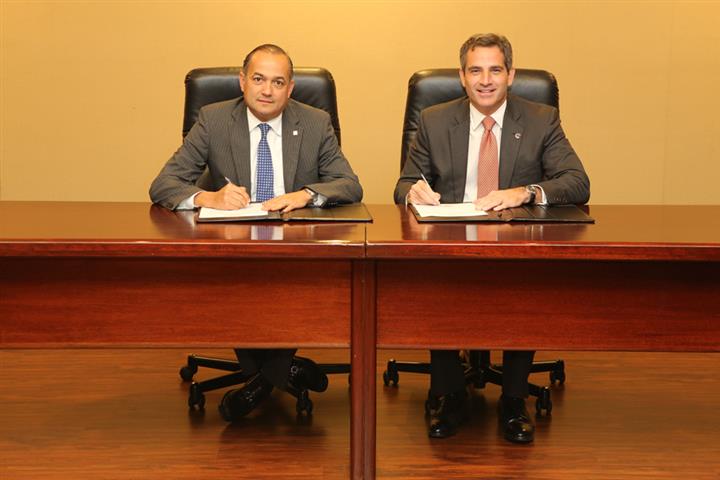Both companies have launched a pilot plan at grocery stores and pharmacies
Banco Popular Dominicano and the company GCS Systems (tPago) signed an agreement to develop various initiatives that will promote the financial inclusion of thousands of Dominicans, who currently do not have access to traditional banking services.
In this way, both companies have begun to collaborate in the deployment and implementation of certain financial operations through non-banking commercial establishments. Among other transactions, these businesses may accept on behalf of the financial institution payment of loans, payment of credit cards, deposits and withdrawals of accounts.
In this collaboration framework, Popular and GCSSystems carry out a pilot plan in different grocery stores, pharmacies and other businesses in the capital. They offer customers the so-called virtual wallet, a prepaid account in Banco Popular, associated with a mobile phone with tPago, in which customers charge with cash in one of the banking sub-agents and can perform, in a simple manner, transactions such as minute reloads, transfers, bill payments, among others.
This financial inclusion agreement is feasible thanks to the Regulation of the Banking Sub-agent, a new regulatory framework approved by the Monetary Board last March, whose ultimate goal is to facilitate access to basic financial services to segments of the unbanked population and to carry said services to places of the national geography until now not covered by the traditional financial entities. The signatories of the agreement, Messrs. Juan Lehoux A., Executive Vice President of Personal Businesses and Branches of Banco Popular, and Brian Paniagua, CEO of GCSSystems, were very optimistic about the future of the figure of the banking sub-agent, since for many families will be an opportunity to reduce the entry barrier to the regulated financial system. It is estimated that 60% of the population of the Dominican Republic is not banked.
The banking sub-agent in Latin America The figure of the banking sub-agent, although recent in the Dominican Republic, has long been present in other Latin American nations such as Peru, Mexico, Ecuador, Colombia, Venezuela, Chile, Bolivia or Guatemala. The pioneer country was Brazil, where bank subagents emerged in 1973 and now exceed 150,000 commercial establishments. In all these countries, these businesses benefit from a greater flow of customers, who, in turn, access financial products in familiar places and with extended hours. Its proliferation has reduced the use of physical money, replaced by electronic transactions, which affects the safety of users. At its last meeting in Mexico, the nations that make up the G-20 ratified that financial inclusion, like that achieved through the network of bank subagents, is “a necessary condition for poverty reduction”. For this reason, the Popular develops these initiatives aligned with its Corporate Social Responsibility programs to improve the quality of life of the communities.
De este modo, ambas empresas han comenzado a colaborar en el despliegue e implementación de determinadas operaciones financieras a través de establecimientos comerciales no bancarios. Entre otras transacciones, estos comercios podrán aceptar en nombre de la entidad financiera pago de préstamos, pago de tarjetas de crédito, depósitos y retiros de cuentas.
En este marco de colaboración, el Popular y GCSSystems llevan a cabo un plan piloto en distintos colmados, farmacias y otros comercios de la capital. En ellos se ofrece a los clientes la denominada billetera virtual, una cuenta prepagadaen el Banco Popular, asociada a un teléfono móvil con tPago, en la cual los clientes cargan con dinero en efectivo en uno de los subagentes bancarios y pueden realizar,de manera sencilla, transacciones como recargas de minutos, transferencias, pagos de facturas, entre otras.
Este convenio de inclusión financiera es factible gracias al Reglamento del Subagente Bancario, un nuevo marco regulatorio aprobado por la Junta Monetaria el pasado mes de marzo, cuyo fin último es facilitar el acceso a servicios financieros básicos a segmentos de población no bancarizados y llevar dichos servicios a lugares de la geografía nacional hasta ahora no cubiertos por las entidades financieras tradicionales. Los firmantes del acuerdo, los señores Juan Lehoux A., vicepresidente ejecutivo de Negocios Personales y Sucursales del Banco Popular, y Brian Paniagua, CEO de GCSSystems, se mostraron muy optimistas ante el futuro de la figura del subagente bancario, ya que para multitud de familias supondrá una oportunidad de reducir la barrera de entrada al sistema financiero reglado. Se estima que el 60% de la población de República Dominicana no está bancarizada.
El subagente bancario en Latinoamérica La figura del subagente bancario, aunque reciente en República Dominicana, goza de larga data en otras naciones de América Latina como Perú, México, Ecuador, Colombia, Venezuela, Chile, Bolivia o Guatemala. El país pionero fue Brasil, donde los subagentes bancarios surgieron en 1973 y a día de hoy superan los 150,000 establecimientos comerciales. En todos estos países, estos comercios se benefician de un mayor flujo de clientes, quienes, a su vez, acceden a productos financieros en lugares familiares y con horarios extendidos. Su proliferación ha reducido el uso de dinero físico, sustituido por transacciones electrónicas, lo cual repercute en la seguridad de los usuarios. En su última reunión en México, las naciones que conforman el G-20 ratificaron que la inclusión financiera, como la que se logra con la red de subagentes bancarios, es “una condición necesaria para la reducción de la pobreza”. Por ello, el Popular desarrolla estas iniciativas alineadas a sus programas de Responsabilidad Social Empresarial para mejorar la calidad de vida de las comunidades.







